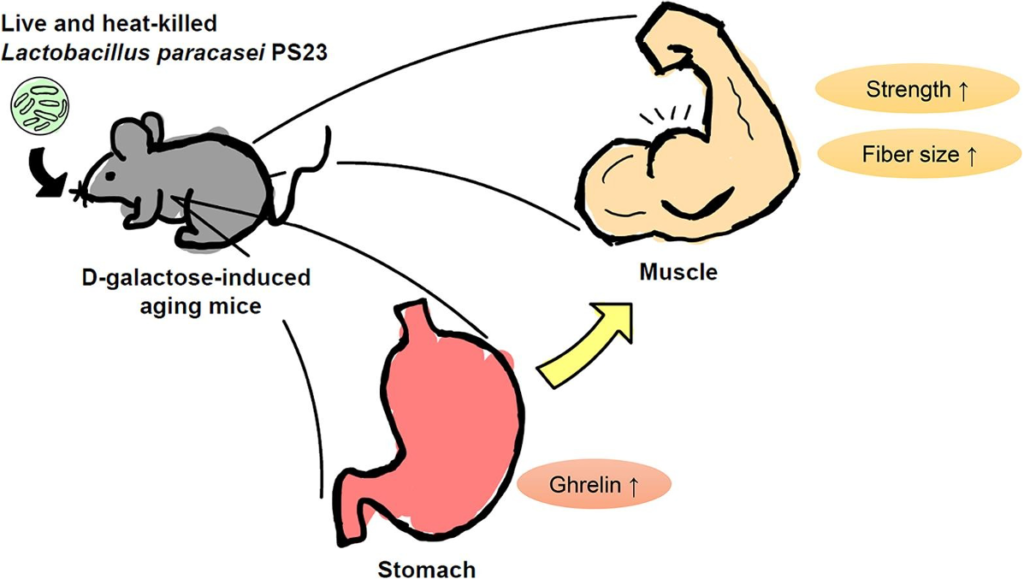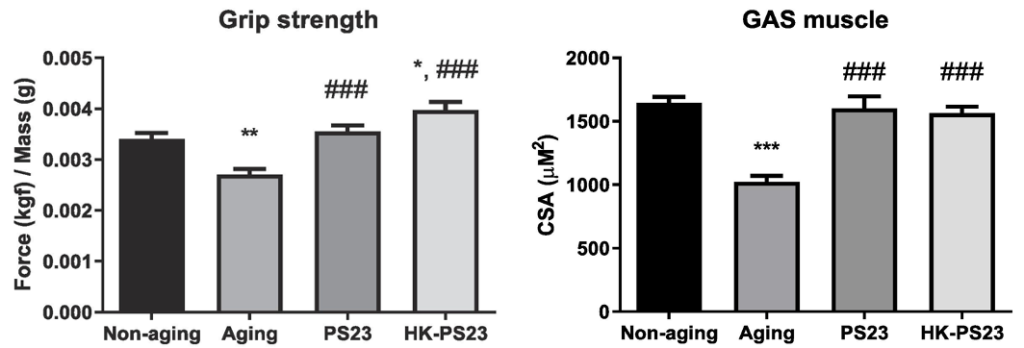Probiotic Alleviates Muscle Aging in New Study
Bened Biomedical scientists increase muscle strength and size and stimulate the ghrelin hormone with Lactobacillus parcasei PS23, a probiotic, in age-accelerated mice.
Highlights:
- Treating age-accelerated mice with living or heat-killed Lactobacillus parcasei PS23 (PS23) increases grip strength and leg muscle size.
- Increased grip strength is correlated with increased ghrelin gene activation in the stomach.
- PS23 increases ghrelin in human gastric cells.
Aging is closely linked to our gut bacteria, which is why scientists have been testing the effect of different probiotics — beneficial gut bacteria — on the progression of aging. In aged mice, probiotics have been shown to improve memory and muscle decline by decreasing inflammation and improving mitochondrial function. Still, it is important to determine which probiotics are the most beneficial for countering aging.
Cheng and colleagues report in Journal of Functional Foods that PS23 supplementation alleviates muscle aging via ghrelin stimulation in D-galactose-induced aging mice. They show that PS23 increases muscle strength and size in these age-accelerated mice. They also show that PS23 promotes the secretion of the hormone ghrelin, which is correlated with increased strength. Finally, the researchers show that PS23 increases ghrelin secretion in human cells.

PS23 Increases Muscle Strength and Size and Stimulates Ghrelin Secretion
To establish a mouse model for aging, Cheng and colleagues induced aging in young mice by injecting them with a sugar called D-galactose. Researchers use D-galactose to accelerate the aging process and eliminate the time it takes for mice to age naturally. Like naturally aged mice, accelerated aging mice are weaker and have small muscles than young mice.
The Taiwan-based investigators tested the effect of both living and dead (heat-killed) PS23, as dead probiotics have some advantages over living probiotics, such as improved safety and a longer shelf-life. The results showed that feeding the aging mice with either form of PS23 restored their strength and muscle size. Notably, dead PS23 increased strength beyond that of young non-aging mice.

Ghrelin is called the “hunger hormone” because it is secreted when our stomach is empty, making us feel hungry. Ghrelin is also involved in preventing muscle atrophy. Cheng and colleagues found that age-accelerated mice had a reduction in ghrelin secretion, and feeding them PS23 restored ghrelin levels. Furthermore, the increase in ghrelin was associated with increased muscle strength.
The researchers next tested the effect of PS23 on ghrelin secretion in human gastric cells. They found that dead PS23, but not live PS23, increases ghrelin secretion. These findings suggest that dead PS23 could promote ghrelin secretion in humans to promote increased muscle strength. Ghrelin may protect against muscle atrophy by promoting the secretion of another hormone called growth hormone.

Are Probiotics Enough to Cure Muscle Decline?
Sarcopenia — the age-related loss of muscle mass and strength — is a serious problem, as it leads to an increased risk of early death and impedes the quality of life. In the search for the perfect sarcopenia treatment, scientists have come to a combination therapy that includes omega-3 fatty acids, the amino acid leucine, and PS23. In a clinical trial, this combination therapy prevented muscle loss and decreased visceral fat while increasing grip strength and improving the physical performance of older adults. While there have not been studies testing the effect of PS23 alone, this clinical study suggests that probiotics like PS23 could help counter muscle aging. Notably, PS23 is an ingredient in several Bened Biomedical products.
Model: C57BL/6J mice injected with D-galactose to induce aging
Dosage (oral): PS23 10^9 CFU/day, or HK-PS23 10^9 cells/day

